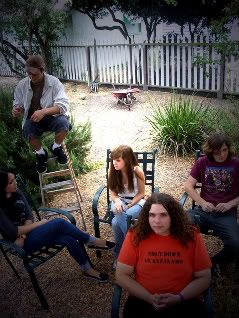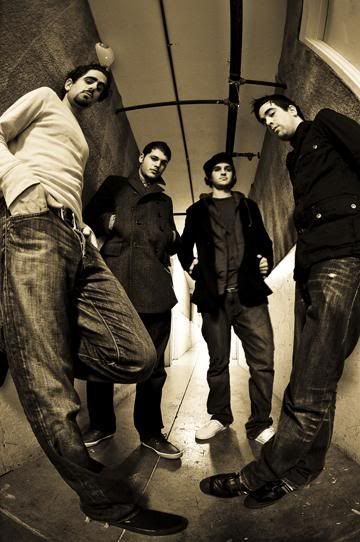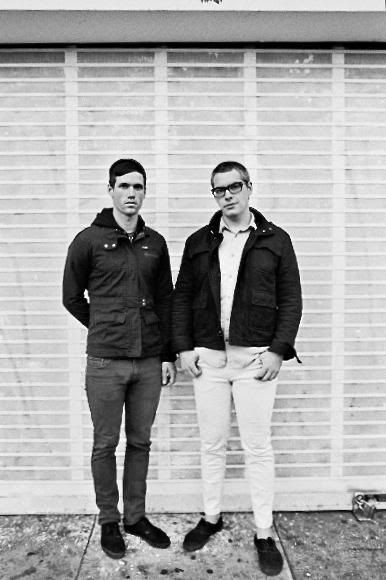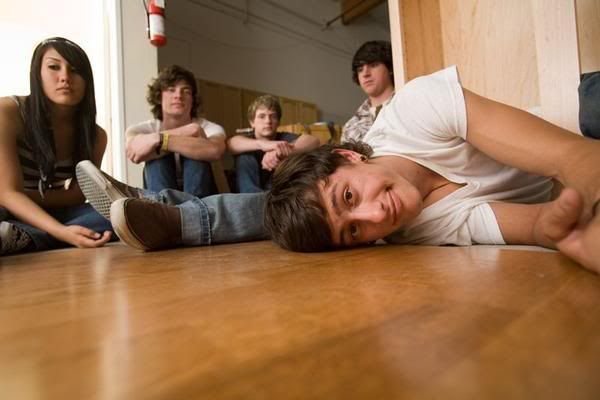
With the rise of their first full length entitled "Apartheid of The Mind" , Pericardium has cemented themselves as a local staple. They are the groove and progressively fueled band that we see today. I sat down with Sean and Dave of Pericardium to talk about everything from E-40 to Politics.
This is the lame cliche question , but how did you guys get your name?
Sean: Actually, I came up with the name. I was honestly, straight up, in a physiology class my senior year, I was looking through this book and I found the word "Pericardium," which is the membrane that surrounds the heart, and I felt that what Brooke and I were trying to do was write lyrics that were relating to the heart. I wanted to do things that were close to me, really relevant.
That's really it. We're surrounding our heart. We're writing about things that we think are important.
Dave: As corny as that may sound.
Sean: Yeah, we're trying to write about real shit.
Every band has goals. Some don't, but where do you guys see yourselves in 6 months?
D: I think one thing that would be really good for us, would be to at least have an EP, but I think it would be even cooler to come out with a full length in six months. It'd also be nice to go on a small tour within that time period.
S: It'd also be really nice to get enough money, and face the current gas epidemic.
D: Yeah, or figure out a way to teleport.
S: Maybe even visit the states that are close to us.
So, do you guys see yourself trying to expand your sphere of influence as a band, or your fanbase?
S: I suppose. Honestly, I guess, for a larger goal for myself, I want to wake people up. I want to see people start caring. I went to this show last night with all these trendy electro scene bands, and it just made me so disgusted that this kind of stuff was bringing 100 people for a band at the door. It's this total crap music that has no political, social, or introspective relevance what so ever, and I just want to see people care. I think part of what made the 60's and the 70's so damn good is that people really cared, and were united for a cause. If you aren't alarmed by what is going on right now, then you are sleeping.
D: If you're talking about fanbase, I feel that we would be a lot more popular with an older crowd. I felt like we were getting a lot more positive attention when we played in San Fransisco as opposed to San Jose. I just felt that we fit in better in San Fransisco.
So you are aiming for an older audience?
D: I think that they would understand, more maybe, what we're trying to convey.
So here are two questions that I'm going to tag onto that; one being, do you guys feel like you recieve criticism for having a political message? Do you feel like that's kind of over looked, or do you feel that people are being critical of it?
D: Maybe not being critical, but maybe just not caring. Maybe just saying, "Thats another political band!"
S: I think we just have mixed responses. I mean, I've actually talked to a number of young people. More young girls than guys. I think that young guys are still in the aggressive state of mind. It seems that a lot of young girls are more into the idea of trying to change the path of this country. But a lot of people just entirely over look it. I think it's a difficult market to please with what we're doing.
You mentioned before that you were disgusted with what the bands were doing, or maybe at least the message they had. Do you feel that musicians have an obligation to bring morale or political issues up? Or do you feel like its a good idea, not an obligation, to speak out?
S: I don't think they have an obligation, but I think if you're smart, you'll take your position of authority and reach and do something with it. If you feel like you have the ability and gift to want to get up in front of a bunch of people and sing, I think you should try to convey things that are important.
D: It doesn't just have to be pushing a message if you're making music, to make people feel a certain way. Make them feel happy, or bring them up when they are depressed, as opposed to violent messages. I guess there's just some music out there I don't care for.
S: For example, not every band needs to push a political message, but one of the bands I saw last night was these three girls dressed up in these skanky outfits, and their chorus to one of their songs was, "Lets get fucked up! Lets get fucked up!" And there are all these 13-16 year old girls in the crowd, who don't need to hear this stuff. What if they heard, "Respect yourself"?
D: But that's not cool! (laughs)
S: Right! But that's only because of the big huge propaganda machine that is the media in this country. We need to distance ourselves from that, and we need to put the cosmopolitan down; we need to close the Fox News Portal of Whatever. Get yourself reaquainted with yourself, and the people around you, instead of this crazy consumer driven machine that our country is.
Kind of tying into that idea of propaganda and what revolves around that; explain to me why you titled your album, "Apartheid of The Mind." That's kind of an interesting phrase. People think of South Africa when they hear the word 'Apartheid'. That's not a word that is normally used, so what was your reasoning behind it?
S: The whole reasoning behind AOTM was making a draw to the South African Apartheid, as well as the situation in Israel. Basically, when I hear the word Apartheid, I think of black and white, like the segregation of South Africa. Essentially what is happening in this country, at least in my eyes, is that the media machine is trying to segregate us into the idea of black and white. Like dave was mentioning before that certain things aren't cool, I feel like we are being made to think a certain way; we are made to be divded.
D: Even in politics, with the Democrats and the Replublicans, where it's a two party system.
So, the government is kind of saying, "You have to think: you're on our side or you're against us?"
D: Well there's that, but also politically, you have to think that you're either a Democrat, or a Replublican, or you're either this or that.
S: You're good, you're bad.You're black, you're white..
D: Even with gender. I took a socialology class, where they said that people think in terms of, "you're either gay or straight!" When in reality, there are a lot of little things that go in between.
S: You're either a man or a woman.
D: America is so much about labels. We always have to label everything! "I am a vegetarian!" or "I am gay!" What makes this? Who decided whether this was wrong or right?
S: So, the reason that it would be, "Apartheid of the Mind," is because in this country, obviously Apartheid was a really violent thing when it was going on in Africa, and the Israeli - Palestinian conflict is very bloody, but in this country, I feel like they aren't doing things to us physically; they aren't saying, "You have to use this bathroom, and you have to use this bathroom." They are doing it to our minds. They're making a young girl think, "I'm pretty," or, "I'm unatractive." They're making a young guy think, "I'm either full of testosterone," or, "I'm weak." Really, thats not what it is. There's a whole lot of leverage in between that. We're really being brainwashed by this system. Althought we've had the civil rights movement, blacks have rights, and women have rights, and we all have our rights; we still perpetrate stereotypes on television, and we still use derogatory language as our humour.
As far as the Western World, I really feel like there is an Apartheid going on in our minds. That we aren't allowed to freely think, and that we are totally being segregated as what we see as being good and bad.
I agree with that, more towards the idea of stereotypes. People get so riled up about gay rights and how we need to respect gay people, but then you have shows like, "Will and Grace," that totally portray gay people as a big joke. A big walking stereotype. Gay Jokes are now a brand of humour.
Now to jump more towards music, what are some of your musical influences? Or more, really, what were the things that influenced you to play music at a young age?
S: Well, for dave and I especially, Pink Floyd is a really big influence for us. For more modern bands, Porcupine Tree is a really big influence for me, and Dave, and Brooke.
D: What about what got you interested in singing and playing guitar?
S: So, those kinds of bands would definitley be in the more progressive genre, but I've always been infatuated with music since a young age. When I was in 2nd, 3rd, 4th grade, I took piano lessons. Then, in 5th and 6th, I played percussion. In 7th grade, I had a friend who played guitar, and I said, "Damn that looks really cool." In about 8th or 9th grade, I started picking up guitar. At the time I was into more nu metal stuff like Slipknot. I started to really get into Pink Floyd at the start of 9th grade.
It kind of mellowed you out.
S: Yeah, seeing guitar in a different light I guess. Seeing music in a different light. More so than a guitar player or singer, I see myself more as a songwriter or visionare. I see songs. I see the things that make sense, and I hear things a certain way. I feel that the music is both something that is in your ears; it's an audio presentation, but it's also a visual presentation. Alot of times, if I sing, I see and feel different colors. Music's really in me. It's totally a part of me, and actually music never stops running through my head, constantly. So when I hear it, it's almost orgasmic.
D: Do you ever get, like a tingling feeling when you listen to music, like on your back?
Yeah, especially if I'm listening to a piece of music I find moving, or sometimes certain classical music will do that for me. What about you, Dave?
D: So, my mom always played guitar. She was always this trippy, wierd kind of lady that did a lot of drugs when she was younger. She always played guitar when she was young. My mom and grandmother and sister all played piano, so music was around me a lot when I was young. There was also this time that my grandfather took me to his homeless friends house.. er.. well, it was more of a shack, and had me try out this guitar, and I really liked it, so for my birthday he ended up getting me that guitar. I liked guitar, but I wasn't so sure it was me, so in the 6th grade I had some lessons, but I still didn't really know about it. Then, I tried bass when I was in 8th grade, so I sold my guitar and got a bass. Started taking lessons for that. I loved bass, and I really could tell that this was me. I've always liked lower sounding instruments; I remember I always wanted to play a saxophone. Then, I met Sean in 10th grade, at Lincoln Highschool, and started hanging out with this mother fucker. He really got me into Pink Floyd at this time. I already knew some tracks off of Dark Side of the Moon, but I was curious about what other Pink Floyd albums there were, so he ended up burning me about four of their albums. He also got me really into Porcupine Tree. Before that, I was listening to grung. My depressed middle school days. (laughs)
So, Sean, have you ever written any songs that have just come to you out of the blue?
D: Sometimes you'll start jamming on something that sounds good, and pulling words out of your ass that are really good too.
S: Typically, the words I pull out of my ass are for the melody, and then I'll go back and start writing words. I don't ever just sing, "My heart is broken!" It comes along differently. We were actually headed up to Tahoe one time, and I was writing this poem, or lyrics, or whatever you want to call it, and I already had this riff, and he had this bass line. We started to play it together, and it sounded really good, and I said, "Shit, this might actually work."
D: Well, we were also on shrooms at the time. (laughs)
Do you guys think you might write or sing about things besides politics?
D: Oh, for sure! I'd love to. I was thinking about this a little while ago. We're Pericardium! We should sing about everything that goes on in ones life.
S: Well, yeah, thats how the first album was actually.
D: We should definitely continue in that later on.
S: The first album only really has two political songs on it, "White Phospherous," and, "Apartheid of The Mind." The rest of them are about..
D: One is about ecstasy..
S: There're things about addiction, drugs, eating disorders, apathy, and sleep.
Then, do you think that the face of Pericardium will change; because a lot of people see you as a very political band? I mean, you open up your sets with the political samples. So, that definitely tunes people on to politics. Do you think that the focus for the time being will change then?
S: I think that the new songs that we have all have a political element.
D: But they're not saying, "THIS is a political song." It's not like Rage Against the Machine.
S: I guess it's just the current state of this country has made me write lyrically, because I'm pretty frustrated with the way things are. I could sit down and pick apart what each song means, but since most people haven't heard them, it would be irrelevant, but there is definitely a political face, because there has been a lot of political strife. But these new songs are going to be a lot of things based on how I'm feeling.
So, then would you say as a band you're very extroverted, or very introverted?
D: I would say that we're trying to become even more broad.
S: One of our songs, "Unattainable," is partially about how we lost two really good friends this last year.
Yeah, I heard about that. I understand they died in a car accident?
D: Yeah, they fell asleep at the wheel going about 100 mph.
S: They had been working construction, and they were driving really early in the morning. When I had first started writing the song, I just had the first part, and then this happened. That's what's really unattainable. These guys are gone forever. We can never see them again. That has a really personal aspect for us. We have gotten personal, but as far as specific things, it just depends on how things progress for us.
We all have people that we look up to, and I think that musicians get pigeonholed into being seen as only being influenced by other musicians, but who are some of the people that influence you besides musicans?
S: Hunter S. Thompson is a really big influence for me. I actually started reading him in my Junior year when I was into journalism. I saw him as doing something outside the box. If you read Fear and Loathing in Las Vegas, he was given $300 dollars to go to Las Vegas and cover this race, but instead of using it to get a proper hotel, he uses the money to buy drugs, goes there, and then trips the fuck out. He goes and writes his thing, but he didn't give two shits about this race cause he was taking the system and then taking advantage of it.
He actually did it, but he just broke the bounds of reality in how he did it.
S: I totally relate to him. I feel like what we're doing breaks the bounds in San Jose, because no bands really have a message. They are about superficial things.
with anything in life, you should push the boundaries, and see what's going on. Also, my family influences me alot. I have a lot of crazy people in my family. My grandfather on my dads side, he was an intelligence officer in Vietnam. He's written two books, seen the world. He's coming to Mexico so that the family can see him, because he doesn't want to come back into America. I look at that, and I wish I just had the balls to do that. My grandfather on my moms side, is a Vegan Buddhist Jew, who is directing low budget stuff in Hollywood, doing what he wants to do. Following his dream, whilst staying true to his values and what he believes. And everytime I have conversations with either of those guys, it's enlightening.
Would you say they are your gurus for life?
S: They are just impressive ass people who have always meant something to me. It's always cool to look at people who have been in the lime light. I think it's cool to look at people around me.
D: For me, my family to a degree. So, for myself, it's really taking bits and pieces of people I meet along the way, and taking what I like.
S: Also, E-40, for telling me when to go.
D: Britney Spears also.
Any plans or shows coming up?
D: Getting addicted to heroin.
S: Buy our merch and suck our dicks!(laughs)
D: Talk about Fast cars and fucking bitches.
S: Go to Walmart; buy all our meals at McDonalds. Get McCain up in office!(laughs)
D: Actually get our EP going.
S: Yeah, work on maybe getting 6 or 7 songs going for our next release.
D: Maybe have a retarded song on there too, just to make people question whether we're a real band or not.
I wish I knew what that means! I wish I was that profound.
S: I guess it's just a matter of time. We have the funds, but we want to be prepared.
So, finally, a lot of people throw out the phrase, "The Scene is dead." What does that mean to you? And if that's true, how do you feel that the scene has been killed? If not, how do you think people buy in to that if it's a myth?
S: If that is true, it's the fault of the musicians, it is the fault of the people not demostrating enough interest, and the bands not demanding enough interest in the people. I feel that San Jose was really driving. We had the brutal hardcore scene, and the pop punk scene, but I think what we have now are some really good bands, who just need to relocate themselves to San Fransisco, or focus on SF as much as possible.
D: The scene isn't really dead; the scene to us might suck, but there is the san jose scene, which is screamo, hardcore, lets kill everyone music. If people like that kind of music, then the scene isn't dead, but for people who don't enjoy that kind of music, the local music scene is going to seem void of life, because the type of music they don't like isn't around.
So, it's very relative?
D: Very much so.
S: There're some really sick bands that have come from this area. Strata came from here, Dredg came from here. Day one Symphony, Delta Activity, which is now Good Hustle.
D: Well, all those bands are gone though now.
S: Well, not entirely. Dredg is about to release a brand new album. David Knight is still in the area, from Day One Symphony. New things are coming up as well.
D: So to sum it up, the scene's not dead. There're a lot of bands out there, and they might not be good in our eyes, but they are out there doing their thing.
Well thank you guys for the interview, and we'll hopefully talk to you soon.
You can check out Pericardium online at
myspace.com/pericardiumband!
Till next time!
B-Sides



